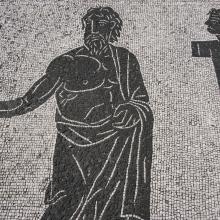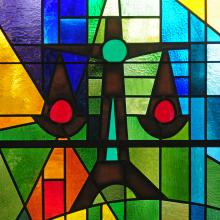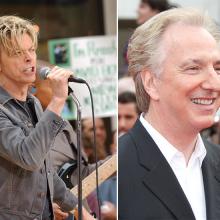Theology
KENYATTA GILBERT: What does “being prophetic” mean to you today?
WALTER BRUEGGEMANN: I think it means to identify with some clarity and boldness the kinds of political and economic practices that contradict the purposes of God. And if they contradict the purposes of God, they will come to no good end. If you think about economic injustice or ecological abuse of the environment, it is the path of disaster. In the Old Testament they traced the path of disaster, and it seems to me that our work now is to trace the path of disaster in which we are engaged.
The amazing thing about the prophets is that they were able to pivot, after they had done that, to talk with confidence that God is working out an alternative world of well-being, of justice, of peace, of security—in spite of the contradictions.
How do we establish a sense of clarity about who we think God is in this world of radical pluralism? As long as we try to talk in terms of labels or creeds or mantras, we will never get on the same page. But if we talk about human possibility and human hurt and human suffering, then it doesn’t matter whether we’re talking with Muslims or Christians or liberals or conservatives; the irreducible reality of human hurt is undeniable.
“These dark times call for a different kind of scholar. We must step into the fray,” Glaude said. He concluded, “If you choose to sit on the sideline, you have chosen a side."

Image via Felix Lipov/Shutterstock
Among the victims of police brutality was none other than Christ himself. While this notion conjures up mixed emotions — including unbearable sadness — we should also take heart. Jesus experienced and overcame police brutality — so can innocent, powerless black women and men. To do so, churches with those most affected by police violence in attendance must cultivate a liberating praxis of anti-oppression retaliation, which includes teaching the characteristics of Christ’s response to law enforcement victimization. The writings of the great theologian James Cone, and others after him allowed us to rip the misguided veil of blasphemy and usher black people into a newfound solidarity with Jesus of Nazareth.
mother! is a disturbing portrait of God that says nothing good about God's followers. Immediately after watching the visitors kill her child, mother hears Him say that these people must be forgiven — that they didn’t mean to do it, that they only want to be close to Him. The Christian theory of redemption is supposedly one of forgiveness and sacrifice, predicated on Christ’s death and resurrection, but the death of this child doesn’t read at all triumphant. From the mother's point of view, the visitors were never supposed to be in the house in the first place — if they hadn’t intruded on her life, they wouldn’t need forgiveness for killing her child.
For the brilliant theologians who teach and research at seminaries or divinity schools, part of their work is training the next generation of future pastors for church leadership. Catholic and many Protestant church leaders have received a thorough theological education (though not all). They possess Masters and Doctoral degrees that solidify their ability to grasp the tenets of theology. But for those theologians interested in changing the world for the better, they must offer work that is easily understood by the masses, especially the marginalized population they are seeking to assist.

Image via IR Stone/Shutterstock.com
I’m not here to argue about whether Paul’s point is a good one — by all accounts, he does a fine job telling the biblical story in a way his gentile listeners can understand. I, like Paul, am a Christ-follower. I’ve already bought what he’s selling. I’m asking about the way he makes his point — I’m pushing back against the notion that Christianity is an idea that can and should be argued in the public square.
Restoration and reconciliation with God is the ultimate goal. It is the incarnate Jesus who provides the way back for humanity to be restored and reconciled to God. This is the essence of the Christian faith.
We are steeped in a culture that celebrates endless work and the denial of one’s own health. Christian faith leadership demands a counter-witness. Ministry life should reflect a theology of service and commitment both to God and other people, but it should also embody healthy balance and spiritual sustainability for the long work of learning faith and reflecting God’s grace to a world hungry for it.

Image via Ozgur Coskun/Shutterstock.com
The study comes in the same year that Larycia Hawkins — Wheaton College’s first black, female professor to receive tenure — parted ways with the evangelical flagship school after she posted on Facebook that both Christians and Muslims worship the “same God.” The controversy stirred fresh debate among evangelicals about whether all religions worship the same God, and whether God accepts the worship of all religions.

Image via Lawrence OP / flickr.com
Would St. Justin Martyr recognize us as Christians? After reading his, “Discourse to the Greeks,” I have my reservations. I doubt he would recognize me.

Delmas Lehman / Shutterstock
WHO IS THIS JESUS who rattles my cage and rumbles through the history of my life? This contradictory figure who proves an embarrassment and stumbling block to my mind, but who won’t go away? This man who brings awe and tears to my eyes, who makes me want to resist authority when it’s wrong, who points me to a God who works from the underside of every system of power?
Who is this Jesus? Disturbing teacher of the gospels, comfortable with children and irritating to scholars, unsettling people by his enigmatic stories. Dancing member of the Holy Trinity, looking out from a stunning Russian icon. Object of saccharine devotion in the Sacred Heart of Catholic spirituality, the “Jesus and me” sentimentality of evangelical piety, the unbridled passion of 17th-century metaphysical poets.
He’s the first-century Jewish rabbi of the Jesus Seminar, calling for justice and inclusivity, making no ethereal claims about his own divinity. He’s the Jesus of Jelaluddin Rumi, who wants to be born in the mystical experience of every soul. The Cosmic Christ who weaves his spirit through the fabric of the natural world, causing all things to scintillate with the sacramental, Christic presence of the divine.
He wanders in and out of my reading of Bernard of Clairvaux, Marcus Borg, Dorothy Day, Pierre Teilhard de Chardin, and John Shelby Spong. Each with a finger on the mystery of this figure who pulses back and forth in my life: “Jesus, lover of my soul.” “He walks with me and he talks with me and he tells me I am his own.” “Jesus, the very thought of thee.”

Image via Nancy Bauer/Shutterstock.com
God will himself one day hold all humans, and all human governments, to account, but the church has the responsibility in the present to speak words of truth and judgment in advance of that final holding-to-account. This is where John 16 comes in — the Spirit will hold the world accountable on the issues of sin, righteousness, and judgment. And the way the Spirit will do that is through God’s people following the example of Jesus in John 18 and 19, and speaking the truth to power.

David Bowie (left) JStone / Shutterstock.com; Alan Rickman JStone / Shutterstock.com
All of my favorite theologians are dying. David Bowie. Alan Rickman. A couple of years ago it was Pete Seeger. It is as if all my favorite theologians are moving on.
Please take me seriously as I say this. It has been a grief-striking week. Just like when Robin Williams passed, there is this void in my life, in my way of knowing God.

Image via michaeljung/Shutterstock.com
One of the most common criticisms of faith I have heard is this: if there is an all-powerful and loving God somewhere out there, why does this God allow horrible things to happen? In a world where there has always been war, sexual violence, starvation and murder, where is this omnipotent God? Why does he allow these things to happen? Where is she when people suffer injustice?
The Bible gives us plenty of examples of the abuses of the faithful, sometimes even at God's own hand (like in the book of Job). We read of the systemic oppression of the Jewish people and the early Christian church. Through this, God's people were always able to remain steadfast in their faith. Forming a defense of faith in God in the face of realized evil is known as theodicy.
So: In a nation where Blacks have been enslaved, lynched, and raped because of their race, and in time where people must declare that “black lives matter,” how do black Americans form their own theodicy to justify this violence, abuse, and systemic oppression?
And is it necessary to do so?

Image via Lightspring/Shutterstock
Two years ago I sat in a room crowded with 300 angry people and 700 more outside shouting, as I nervously whispered, “I’ve never been in a room where I’ve felt so much white Christian rage.” My colleague, a pastor from Pulaski, Tenn., nodded as I straightened up in my chair.
The crowd had come from surrounding states to this small community forum in Manchester, Tenn. They came to protest the forum’s concern for hate crimes against Muslims. National Islamophobic groups had bussed protestors in from hundreds of miles away, carrying messages and signs based on an ideology — some might say, theology — of bigotry. And they were truly angry, flashing their handguns and shouting down panelists. This was in the summer of 2013, but the memory still reminds me, why I moved to Tennessee to work on an interfaith public education effort to end anti-Muslim sentiment.
To be clear, these weren’t people who wanted to discuss the complexities of interfaith engagement while holding true to our particular faith claims. There are many people in this country who want to talk, for instance, about what interfaith relations mean for evangelism, or why a small number of Muslims today are turning to terrorism, without generalizing the Muslim community or wanting to see harm done to them. These were not the people at the forum, however. One thing alone had brought them to Manchester: fear.

Image via Heather Wilson/Dust and Light Photography
PHOTO ESSAY: On Monday, fifty-seven people were arrested as part of the #UnitedWeFight march and peaceful civil disobedience at the Thomas F. Eagleton U.S. Courthouse. The march was in commemoration of the year-long resistance sparked in #Ferguson by the murder of #MikeBrown.
Young people ignited by injustice, refusing to back down. A nation waking up to the reality of racial disparities. And a church that can no longer remain silent. This, says Eden Theological Seminary professor Leah Francis Gunning, is the real “Ferguson Effect.” As she protested in Ferguson over the past year, Gunning collected interviews from clergy and young organizers. The result is Ferguson and Faith: Sparking Leadership & Awakening Community (Chalice Press, 2015), a behind-the-scenes look at the role of the church in the Black Lives Matter movement. Sojourners interviewed Francis to learn more about the religious community’s role in supporting and sustaining a racial justice movement started by young activists.

Image via Dima Sobko/Shutterstock
Over the past year, #blacklivesmatter has taught me that the work of theology is not limited to the hallowed halls of academic institutions or sermonic reflections from prestigious pulpits on Sunday mornings. At community meetings and rallies, I learned new hymns in the form of movement chants. I learned that protest can be a form of prayer. #Blacklivesmatter is more than a hashtag. It is a call for repentance. It is an invitation into a state of prophetic grief and collective lament that does not anesthetize us from our pain but allows us to reconnect to the depths of our humanity by feeling, together, the torment our silence on issues of racial injustice has sown. It is only together that we will be able to actualize the transformation God is calling us to effect in this world.

Image via SSCREATIONS/Shutterstock
In honor of the one-year anniversary of Michael Brown’s death in Ferguson, Mo., Sojourners asked a variety of faith leaders — Catholics, Baptists, Muslims, agnostics, evangelicals, and humanists — to reflect: How has your faith been challenged, affirmed, or deepened by the Black Lives Matter movement? Has your theology changed? And, most importantly, what are we being called to do?
Here’s what they said.
EVEN AS SOUTHERN states—and GOP candidates—jumped through hoops to distance themselves from the Confederate flag, a backlash erupted among those claiming the flag was merely a symbol of “heritage.” Battle-flag waving Southerners (and Confederacy sympathizers) seemed to leap at the opportunity to wave their banner high.
But what about the rest of us? One of the most profound statements I’ve heard recently came from Rev. Jin Kim, founding pastor of Church of All Nations in Minnesota. This Korean-born pastor stood at the podium of the Sojourners Summit and said with conviction: “I am a white supremacist.”
How can this man, a person of color who’s dedicated his life to ethnic and cultural reconciliation, be a white supremacist? The same way any of us can. After all, at its heart white supremacy is not about white hoods, battle flags, and burning crosses. Those symbols are what we call explicit bias. People know when they are practicing it.
But most often white supremacy is about implicit bias that favors whiteness. It’s about the unconscious associations we make in our minds before we even know we’ve done it. White? Rich. Black? Poor. White? Good. Black? Bad. White? Trustworthy. Black? Scary. You get the idea.
These are the unconscious biases that shape the way we order our lives; the communities we live in, the places we shop, the churches we attend, the leadership from others we accept (or reject), and the policies we support (or don’t).
It’s not hard to fume at the thought of the killer of Mother Emanuel’s Nine. And it feels good to click “like” and share posts calling for the removal of Confederate flags.
But if we stop there, bias beats us. It is the unconscious biases of the masses that keep us from moving forward, not the explicit biases of the few. So, check out this tongue-in-cheek list of four easy ways to be a white supremacist (regardless of your own race).
1. Plan a conference on church planting with a speaker lineup so white it would make Honey Boo Boo blush. And if you want to increase your “diversity,” have one speaker of color (even if he is from India), an Asian emcee, and maybe a black worship leader.






